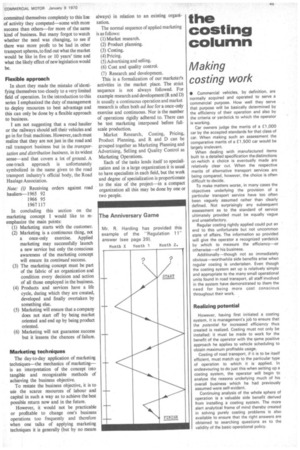the costing column
Page 51

If you've noticed an error in this article please click here to report it so we can fix it.
Making costing work
• Commercial vehicles, by definition, are normally acquired and operated to serve a commercial purpose. How well they serve that purpose will be basically determined by the efficiency of their operation and also by the criteria or yardstick to which the operator is working.
Car owners judge the merits of a C1,000 car by the accepted standards for that class of car. When making such an assessment the comparative merits of a £1,500 car would be largely irrelevant.
When dealing with manufactured items built to a detailed specification the distinctions on owhich a choice is eventually made are relatively clear cut. When the respective merits of alternative transport services are being compared, however, the choice is often difficult to decide.
To make matters worse, in many cases the objectives underlying the provision of a particular transport service have too often been vaguely assumed rather than clearly defined. Not surprisingly any subsequent assessment as to the standard of service ultimately provided must be equally vague and unsatisfactory.
Regular costing rightly applied could put an end to this unfortunate but not uncommon state of affairs. The information so provided will give the operator a recognized yardstick by which to measure the efficiency—or otherwise—of his business.
Additionally—though not so immediately obvious—worthwhile side benefits arise when regular costing is undertaken. Even though the costing system set up is relatively simple and appropriate to the many small operational units found in road transport, all staff involved in the system have demonstrated to them the need for being more cost conscious throughout their work.
Realizing potential
However, having first initiated a costing system, it is management's job to ensure that the potential for increased efficiency thus created is realized. Costing must not only be installed: it must be made to work for the benefit of the operator with the same positive approach he applies to vehicle scheduling to obtain maximum profitable usage.
Costing of road transport, if it is to be itself efficient, must match up to the particular type of operation to which it is applied. In endeavouring to do just this when setting up a costing system, the operator will begin to analyse the reasons underlying much of his overall business which he had previously assumed were self-evident.
Continuing analysis of the whole sphere of operation is a valuable side benefit derived from installing a costing system. The more alert analytical frame of mind thereby created in solving purely costing problems is also available to ensure that the right answers are obtained to searching questions as to the validity of the basic operational policy.








































































































